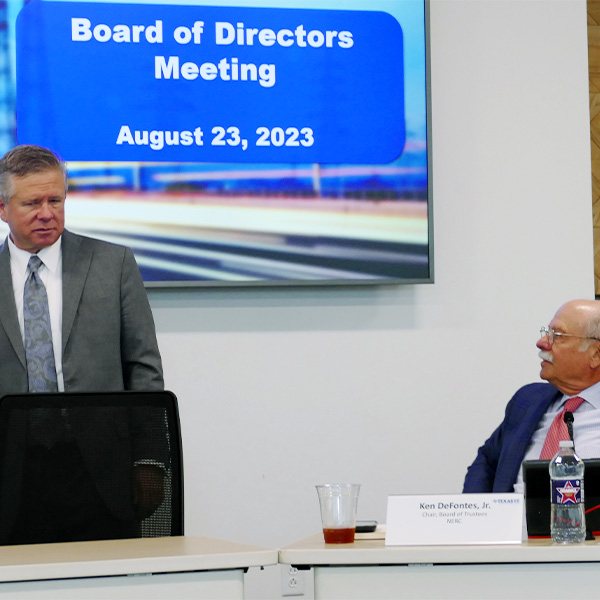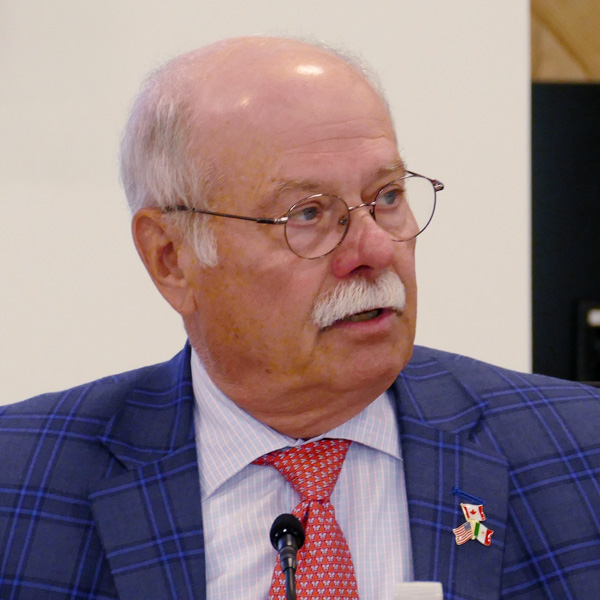
AUSTIN, Texas — The Texas Reliability Entity’s Board of Directors hosted top NERC official Ken DeFontes during last week’s quarterly meeting.
Or, as Board Chair Milton Lee said in introducing DeFontes, “Thanks for visiting Texas at the height of summer.”
DeFontes, who chairs NERC’s Board of Trustees, brought with him the grid’s three competing objectives: reliability, affordability and the environment. Objectives, he said, that are being thrown out of whack by policymakers focused on environmental legislation.
“I think we’ve done a really good job over the years of figuring out how to get to that right balance, to do the job economically, to be responsive and attentive to the impact on the environment at the same time,” he told the board during its Aug. 23 meeting. “We need to get back to that balance, and part of NERC’s job is to better inform policymakers, not only at the federal level but also at the state level because a lot of the impacts are coming from state policy matters.”
Part of the answer lies in the agency’s biennial reliability risk report. The report, released last week, added engagement in energy policy as one of NERC’s five risk profiles. (See ERO Adds Energy Policy to Risk Priorities List.)
DeFontes said he and CEO Jim Robb already are making the rounds on Capitol Hill. He said they’ve been impressed with the level of understanding they’ve seen from Sen. Joe Manchin (D-W.Va.), chair of the Energy and Natural Resources Committee, and other key legislators.
“That’s encouraging to me that there are leaders in Congress who are understanding that as we transition away from dispatchable coal plants and replace them with intermittent renewable resources without a path to get us to whatever the future is going to be,” DeFontes said. “Part of the challenge is our message in the short run is manage the transition. Don’t lose sight of the fact that we’re more dependent on natural gas, so solve the interdependency issue between gas and electric.
“The problem with that message is what happens after that. We don’t really have an answer.”
To help find it, NERC also is conducting an interregional transfer capability study that is due in December 2024, a joint effort with FERC, the regional entities and the industry. NERC says the study, a directive from Congress as part of the recent Fiscal Responsibility Act, could provide “important insights for industry, regulators and policymakers.”
“I don’t think the issue with transmission is a lack of desire or a lack of financing to build it. The issue is getting sited and getting it approved,” said DeFontes, who said he has the scars from building transmission dating back to his utility days. “People really don’t like to see the transmission lines through their neighborhood. We need to move power across state lines, and when that happens, getting the approval to build the line is complicated, particularly for the states in between … there’s no benefit for them. It comes down to the siting and permitting.”
Addressing the Texas RE’s board and leadership, DeFontes continued: “I would love to have you help me figure out what we can do to make that work better, but we need more. The rate at which we’re investing in transmission right now by all indications is far less than what it needs to be.”
ERCOT CEO Pablo Vegas brought a similar reliability message to the meeting. He also focused on the industry’s pace of change.
“The systems are becoming complex because of that pace of change and the need for all of us in positions of accountability or various parts of the electric industry to be able to respond,” he said, “and to adapt our thinking or methods or technologies or processes in our organizations in ways to be able to take advantage of incredible innovation that’s ahead of us and also to be ready for the big challenges that are ahead of us.”
At the top of Vegas’ to-do list is developing a reliability standard. ERCOT staff have proposed a three-part framework that considers the duration and magnitude of a loss-of-load event, along with the occurrence’s frequency. They say this will better quantify LOLE risks when intermittent resources are a large percentage of the generation fleet. (See “ISO Prioritizes Market Changes,” Texas Public Utility Commission Briefs: Aug. 24, 2023.)
“We’re operating at a 1-in-10 standard,” Vegas said. “The last time there was a load shed event [before 2021’s disastrous winter storm] was 2011. One in 10. Was everybody happy with that? Not even close. There’s clearly a lot of opportunities to better define what reliability means, the cost implications and frankly, to be able to have a conversation with constituents.”
Using such a conversation as a hypothetical example, Vegas said, “’This is what reliability standard means. This is what you should expect if we were to get into a situation like this because there is no such thing as zero risk. There is no such thing as no contingency.’ So let’s be upfront. Let’s be realistic.”
Spaulding to Serve 2nd Term
The Texas RE board’s Nominating Committee told directors it’s recommending Suzanne Spaulding be approved for a second three-year term as an independent director. The board will consider her nomination during its December meeting.
Spaulding is a senior adviser for Homeland Security at the Center for Strategic and International Studies and a member of the Cyberspace Solarium Commission. She previously was with the Central Intelligence Agency and the Department of Homeland Security, where she was undersecretary for cybersecurity and critical infrastructure protection.


